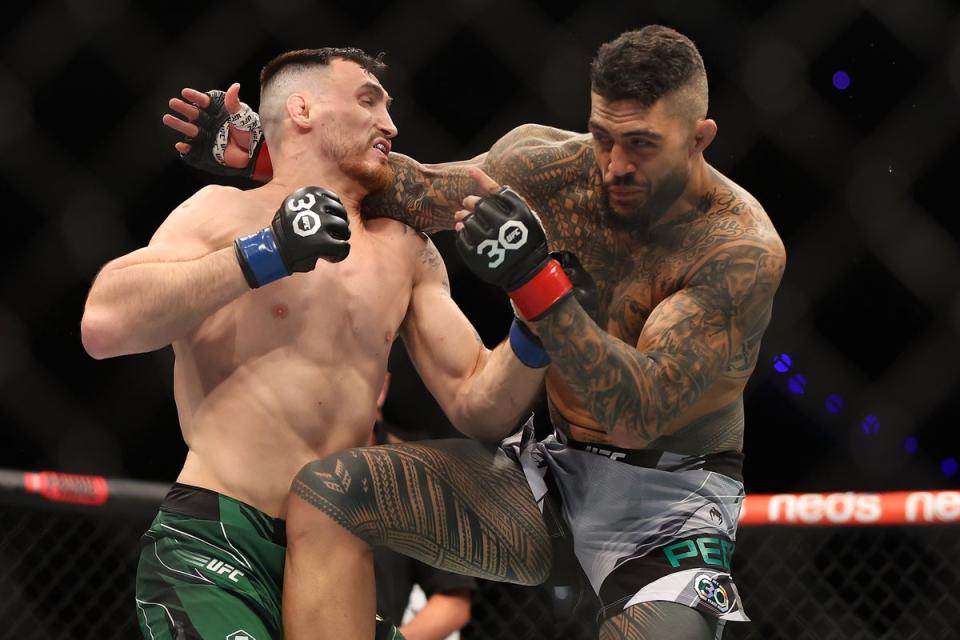Modestas Bukauskas on UFC exile: ‘I was in a picture with no colour, I was mentally broken’
“I live in the middle of nowhere, literally in the woods. It’s like freakin’ Hogwarts out here,” Modestas Bukauskas says, his accent resembling that of a north Londoner, rather than a Lithuanian.
“There’s a bit near my house with no signal, and right before I was about to drive in there, my manager gives me a video call. It was late at night, I freakin’ swerve to the side of the road, completely disregarding that there were about two cars behind me. My manager goes: ‘Bro, you’re fighting in Australia in two weeks – in the UFC.’ I literally broke down into tears.”
It was as if the Lithuanian-born Briton had entered a mirrored reality; one year earlier, Bukauskas had been shedding tears over a call from his manager, but the news was altogether less positive. In late 2021, the development was that Bukauskas had been cut by the UFC. Sitting at home recovering from a serious knee injury, and reflecting on a third successive defeat, Bukauskas had in fact seen the news on Twitter before his manager could even confirm it.
In the year that ensued, Bukauskas was out of the Octagon, but he was still in a cage.
“The amount of pain and struggle, drinking in bed...” The 29-year-old cuts himself off. “Just so many hard f***ing memories, having to go through the deepest and darkest times. I don’t remember a time when I was acting myself. It just seemed like I was in a picture with no colour. Everything was black and white. Mentally, I was broken. I had a lot of things to fix before I could even move forward.”
First to be fixed was the knee. Then, somehow, Bukauskus was indeed able to move forward.
At first, it might have seemed like moving backwards. In 2019, before joining the UFC, Bukauskas had won and retained the Cage Warriors light-heavyweight title; after leaving the UFC, he turned down other offers and opted to return to the London-based promotion. Perhaps, unknowingly, Bukauskas was shining the glass of that mirrored reality. Within two months, and two fights, he had once again secured Cage Warriors’ light-heavyweight crown.
And then came the call – on the side of the road, at the opening of the forest, in the middle of nowhere.
“I was absolutely elated,” Bukauskas tells The Independent. “After I got off the phone with my manager, I was playing some, like, war music in the car – a remix of the Witcher video-game music – full blast for the last five minutes back to my house. I was screaming with just... fierceness. I got home and felt kind of dizzy, it was weird. I didn’t feel like I was there.
“I went upstairs to tell my step-mum, and she was kind of worried, because I was almost out of breath. Then my dad was chilling in bed after a hard day, and he was like (Bukauskas taps into a Lithuanian accent): ‘What the hell do you need to get me out of bed for?’ I brought them downstairs and told them, ‘We’re back in the UFC,’ just hugged them and broke down in tears again. Over the last couple of years, that’s probably one of the happiest moments I’ve had, just me with my family, hugging each other in our sitting room.”

Bukauskas’ father, in particular, understands the struggles that the sport entails. In the 1980s, before the dissolution of the Soviet Union, Gintas Bukauskas learned to fight on the streets of occupied Lithuania, before going on to work as a mixed martial arts coach. Gintas brought his family to Britain when Modestas was three years old and first introduced his son to combat sports two years later.
“I just remember vividly that he would show me some kicks, some moves,” Modestas recalls. “At that age, you’re just like, ‘That looks cool! Look at that kick!’ Literally about a week into showing me some stuff, he goes (Bukauskas dips into that Lithuanian accent again): ‘Okay, now you must train hard.’ My childhood was thrown into strict regime and training. There was kickboxing, sambo. I kind of branched into different sports later – county-level tennis, I went to high school in the US for a couple of years and played basketball and American football – and I took a break from full-on martial arts from 12 to 18. But as a teenager I still became a four-time British kickboxing champion.”
Bukauskas’ father was there through it all, and he was in his son’s corner when the 29-year-old’s journey brought him back to the UFC this February, as Bukauskas took on Tyson Pedro on the Australian’s own turf.
Fighting in Perth on two weeks’ notice, Bukauskas emerged as a decision winner against Pedro over three rounds, greeting the revelation of the judges’ scorecards with a roar of relief in the RAC Arena.
“This is where everything can start to make a solid story,” Bukauskas says. “It’s by no means finished, we’ve got many more things to do, but I’m starting to build a proper comeback story.”
Bukauskas might live off the map, but he is now firmly back on the UFC’s.


